 Parents, do you ever log onto your computer to check out the camp photos for the day, see your child painted in blue from head to toe or maybe wearing a crazy wig and big nerdy glasses and wonder, ‘What in the world?’ The answer probably has something to do with your summer camp’s special events and evening activities. For fifty plus nights (and some days) summer camps entertain your children with some of the zaniest games and wackiest contests that they can come up with. Why? Because it’s fun to be painted in blue from head to toe…seriously. Or at least it is when your cabin is performing a dance to the Smurfs theme in front of the entire camp and you’re Papa Smurf—or Smurfette. And seeing images of your children and their counselors slipping, sliding, and splashing around in what appears to be multi-colored goo…it’s a camp thing…a really fun camp thing. Eye patches are always fun. So is spending a day pretending to be pirates and searching for buried treasure. Becoming a secret agent and collecting clues to decode a message or pretending to be wild animals is also a great way to spend that occasional non-program day. From trivia contests to talent contests and everything in between, some of the greatest moments of summer camp happen during the crazy days and wacky nights!
Parents, do you ever log onto your computer to check out the camp photos for the day, see your child painted in blue from head to toe or maybe wearing a crazy wig and big nerdy glasses and wonder, ‘What in the world?’ The answer probably has something to do with your summer camp’s special events and evening activities. For fifty plus nights (and some days) summer camps entertain your children with some of the zaniest games and wackiest contests that they can come up with. Why? Because it’s fun to be painted in blue from head to toe…seriously. Or at least it is when your cabin is performing a dance to the Smurfs theme in front of the entire camp and you’re Papa Smurf—or Smurfette. And seeing images of your children and their counselors slipping, sliding, and splashing around in what appears to be multi-colored goo…it’s a camp thing…a really fun camp thing. Eye patches are always fun. So is spending a day pretending to be pirates and searching for buried treasure. Becoming a secret agent and collecting clues to decode a message or pretending to be wild animals is also a great way to spend that occasional non-program day. From trivia contests to talent contests and everything in between, some of the greatest moments of summer camp happen during the crazy days and wacky nights!
Tag: summer camp traditions
Summers and Camp Belong in Maine…And So Do You!
Camp Laurel South is a proud member of the Maine Camp Experience. We think Summers and Camp Belong in Maine…And So Do You! Enter to win a Maine Vacation by visiting the Maine Camp Experience website…just follow this link: www.mainecampexperience.com/visit.
Why Maine…
Lakes…Pine Forests…Even Moose
There’s a reason people talk about Maine in such reverential tones. The state has 2,200 lakes. Warm, inviting, crystal clear bodies of water that make most other lakes look like swimming holes. There are hundreds of thousands of acres of pine forests.
Temperate days and comfortable nights, where you feel you can touch the sky. And more miles of beautiful coastline than California. Even mountains — Mt. Katahdin is one of the highest peaks in New England. It’s the perfect setting for summer, one that can’t be matched anywhere.
Tradition
As Forbes noted, there’s something unique about summer camps in Maine. From our acres of prime waterfront to our unspoiled wilderness, Maine has been the only destination of choice for thousands of camp families, with friendships that stretch from generation to generation.
Our summer camps feature the finest facilities, the most sought-after staff and the most unique range of off-site trips. And with more than 100 Maine camps, there’s something to suit everyone.
Geographical Diversity
The lure of Maine extends way beyond the Northeast. Our campers come from throughout the U.S., some from all over the world. (More than 20,000 campers live in 30 states, and several countries!)
Your children will learn to stretch their boundaries and experience life through the eyes of someone whose life is not a mirror image of their own.
Easy To Get Here…Hard To Leave
Maine is a lot closer than you think. An easy drive or flight from most places in the Northeast– about the same distance as a winter ski trip. A great vacation for the entire family.
Whether you’re looking for the famed seaside resorts of Bar Harbor and Camden or a lodge on one of our pristine lakes, Maine has something for everyone — especially kids! Come and visit our Maine Camps and you’ll never want to leave.
The Pine Tree State
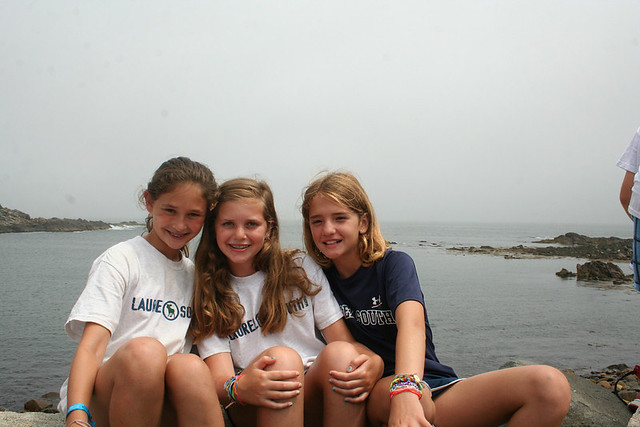 Summer camps got their start in Maine. A century later, they’re still going strong. The Pine Tree State now boasts 100 premier institutions – including The Laurel Camps (Laurel and Laurel South.)
Summer camps got their start in Maine. A century later, they’re still going strong. The Pine Tree State now boasts 100 premier institutions – including The Laurel Camps (Laurel and Laurel South.)
We’re proud to call Maine home. We’re just as proud to utilize the resources of the entire state and to give hundreds of campers an experience unequaled anywhere else.
At The Laurel Camps there’s more than enough room for an exciting depth and breadth of activities. Sports ranging from baseball, soccer, softball and lacrosse to volleyball, tennis and archery. Equestrian. Swimming, sailing, canoeing, kayaking, wakeboarding, windsurfing and waterskiing on crystal-clear lakes.
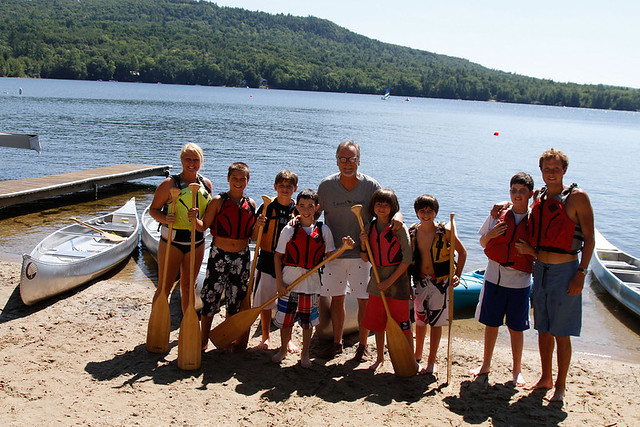 Summers in Maine are never too hot. And the nights are cool (and starry) enough for age-old traditions like campfires and s’mores.
Summers in Maine are never too hot. And the nights are cool (and starry) enough for age-old traditions like campfires and s’mores.
But for campers and staff at Laurel and Laurel South, all of Maine is our playground. We hike tall mountains like Katahdin. We head into the pine forests for ropes courses, rappelling and mountain biking. We explore the coast and ocean-side sites like Acadia National Park, Ogunquit and Bar Harbor.
Campers come to Maine from across the country. Whether they’ve been here in the winter to ski, or have never experienced the wonders of the state, they quickly realize it’s an amazing, magnificent place – vast yet intimate, wild yet welcoming.
Parents love it too – particularly if they plan a day or three in the trendy city of Portland, with a side trip to Kennebunkport, Camden or (of course) Freeport to visit L.L. Bean!
It’s all part of the Maine camp experience – discovering new things, no matter what your age. And you never know…you may be lucky enough to spot a Moose.
Roger and Dagni
Camp Laurel South
Sparking Creativity Through Campfire
 One of the most endearing and sacred parts of summer camp is the campfire. More than just wood lit with a match, it’s an intimate part of the camping experience that goes far beyond simply sitting around a fire. Each camp has a set of traditions uniquely connected to the campfire experience and, to campers, each tradition is significant, demanding reverence. The campfire is the very place where many children recall the moment when their camp transformed from “a camp” to “their camp”, where fellow campers and counselors become family while singing songs, roasting s’mores, and engaging in campfire activities. So intricate is the campfire to the summer camp experience that even former Disney CEO Michael Eisner has reflected on its importance in making him who he is:
One of the most endearing and sacred parts of summer camp is the campfire. More than just wood lit with a match, it’s an intimate part of the camping experience that goes far beyond simply sitting around a fire. Each camp has a set of traditions uniquely connected to the campfire experience and, to campers, each tradition is significant, demanding reverence. The campfire is the very place where many children recall the moment when their camp transformed from “a camp” to “their camp”, where fellow campers and counselors become family while singing songs, roasting s’mores, and engaging in campfire activities. So intricate is the campfire to the summer camp experience that even former Disney CEO Michael Eisner has reflected on its importance in making him who he is:
“Simply consider the lessons I was taught by the campfire…every time the rich reward was the same as we simply sat and enjoyed our consuming creation. And, there was one aspect in particular that never failed to intrigue me, and that was the process of seeing the single small flame of the match spread to the kindling and then the twigs and then the smaller branches and finally the larger logs. It didn’t dawn on me until years later, but this was the perfect metaphor for the creative process…Years later, I found myself running a network television division and then a movie studio and now an entire entertainment company. But, much of the success I’ve achieved can be traced to the direct and metaphorical lessons I learned in building those campfires.”
To some, to assign such significance to fire may seem a bit of a stretch. But to anyone who has attended camp, it’s not only  believable but apt. Beyond Eisner’s metaphor, the campfire is symbolic of camp, and represents the bonding between campers and nature. Campfires instantly evoke feelings of togetherness and promote an atmosphere of being together in an intimate setting that is unique to the people who are present. Many camps hold opening and closing campfires to welcome campers and immerse them in the camping experience and to help them say goodbye at the end of the summer. At the beginning of the summer, the flames represent the birth of a new summer. Opening campfires often include some sort of ritual that introduces an idea or process that can be re-visited throughout the summer, such as setting goals for the summer or some sort of introduction and bonding activity with camp “siblings”. The meaning of the flames, however, transforms at the end of the summer. The burning of a closing campfire represents the end of the season. It’s a way to give the summer a proper and respectful send off. Campfires held throughout the summer supplement overnight camping trips and special events.
believable but apt. Beyond Eisner’s metaphor, the campfire is symbolic of camp, and represents the bonding between campers and nature. Campfires instantly evoke feelings of togetherness and promote an atmosphere of being together in an intimate setting that is unique to the people who are present. Many camps hold opening and closing campfires to welcome campers and immerse them in the camping experience and to help them say goodbye at the end of the summer. At the beginning of the summer, the flames represent the birth of a new summer. Opening campfires often include some sort of ritual that introduces an idea or process that can be re-visited throughout the summer, such as setting goals for the summer or some sort of introduction and bonding activity with camp “siblings”. The meaning of the flames, however, transforms at the end of the summer. The burning of a closing campfire represents the end of the season. It’s a way to give the summer a proper and respectful send off. Campfires held throughout the summer supplement overnight camping trips and special events.
 To say that the campfire breeds creativity is not only accurate, but understated. The various representations and meanings that the actual fire itself takes on helps campers learn to look at the same thing from different angles, a crucial aspect of honing creative thought and learning to think “outside the box”, which is essential to developing good problem solving skills. When considered from this perspective, it’s not at all difficult to imagine a CEO of one of the world’s largest companies crediting much of his success to his camp experiences, specifically to the campfire. In fact, it provides insight about the significance of camp and how the lessons learned there can be carried throughout life.
To say that the campfire breeds creativity is not only accurate, but understated. The various representations and meanings that the actual fire itself takes on helps campers learn to look at the same thing from different angles, a crucial aspect of honing creative thought and learning to think “outside the box”, which is essential to developing good problem solving skills. When considered from this perspective, it’s not at all difficult to imagine a CEO of one of the world’s largest companies crediting much of his success to his camp experiences, specifically to the campfire. In fact, it provides insight about the significance of camp and how the lessons learned there can be carried throughout life.
Feeling Groovy at Camp–Now and Then!
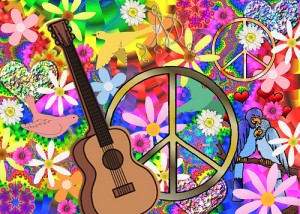 When I think about “camp songs,” I immediately think about singing around campfires, but each year at camp also has a distinct popular music soundtrack. Recently, campers weighed in on Twitter about the tunes that remind them of past summers and that got me thinking about what the United States and camp was like in the 1960s and 1970s.
When I think about “camp songs,” I immediately think about singing around campfires, but each year at camp also has a distinct popular music soundtrack. Recently, campers weighed in on Twitter about the tunes that remind them of past summers and that got me thinking about what the United States and camp was like in the 1960s and 1970s.
Hadley Hury remembers You’re A Good Man Charlie Brown (1969) and Music Man and the Counselors’ Show from 1970. That’s also when Charlie Ziff was theater director, Hadley was assistant director and Jay Newman had the job of radio director for The Fantastiks. 1969 was the year that campers watched the moonwalk on television in the theater and there was lots of talk about some “big thing going on in some little town called Woodstock!”
Bobby Brickman says he has vivid memories that revolve around people who played lead roles in productions of Brigadoon in 1961, Carousel in 1963, and Bye Bye Birdie in 1963. It’s clear that for a very long time, camp has been the place to put creativity and passion into great performances!
Barbara Gough adds that when she hears the captivating bass line of Reach Out of the Darkness by Friend and Lover, she’s immediately transported back to 1968. Friend and Lover was a one hit wonder and their song ranked in the Top Ten during 1968, when Barbara says campers “danced to this playing on the jukebox in the Canteen all summer long!” The song embraced social change with lyrics like “I think it’s so groovy now/That people are finally getting together. . .Reach out in the darkness. . .And you may find a friend.”

Back then, while campers made friends and memories, things in the United States as a whole were not so peaceful. When students in California held a Selective Service sit-in, 3,000 of them were arrested and housed in the San Francisco 49ers’ old football stadium. A promo man got a sound truck and started broadcasting Reach Out of the Darkness towards the students. That’s what started the song’s rise up the charts—and why campers miles away listened to the hit that summer!
The historical events of those times grounded the more multicultural and open society we have today, but during the 1960s, many people felt uncertain as to what the future held. In 1968, when Martin Luther King Jr. was assassinated, Reach Out in the Darkness rocketed up the charts and like other big hits that year, captured the country’s changing mood. Songs that also ranked in 1968 include the Rascals’, People Got to Be Free,Simon & Garfunkel’s Mrs. Robinson, The Beatles’ Hey Jude, James Brown’s Say It Loud–I’m Black and I’m Proud ,and versions of I Heard It Through the Grapevine by Gladys Knight and the Pips and Marvin Gaye.
Summer camp is always a microcosm of our world-at-large, where campers practice and learn skills for negotiating the world, where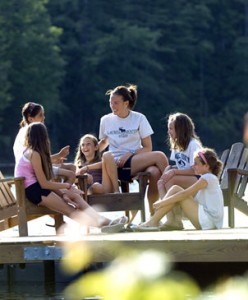 assumptions can be challenged, and where diverse people find ways to celebrate community and appreciate each other. One great thing about camp is that for a few weeks, the world grows a little smaller and everyone listens to the same soundtrack. In a fast-paced and interconnected world, camp “sounds” like the perfect place for connecting with others and as Hadley says, every summer adds up to “good times for campers and staff.” It’s often only later that campers realize how much the experience has shaped them and the way they see the world–much like how hit songs can illuminate the past in retrospect. The music (and fashions) may change through the years, but the core camp experience never goes out of date.
assumptions can be challenged, and where diverse people find ways to celebrate community and appreciate each other. One great thing about camp is that for a few weeks, the world grows a little smaller and everyone listens to the same soundtrack. In a fast-paced and interconnected world, camp “sounds” like the perfect place for connecting with others and as Hadley says, every summer adds up to “good times for campers and staff.” It’s often only later that campers realize how much the experience has shaped them and the way they see the world–much like how hit songs can illuminate the past in retrospect. The music (and fashions) may change through the years, but the core camp experience never goes out of date.
We’d love to hear about how your time at camp contributed to your understanding about others as well as what you’re looking forward to most this summer!
Thanks for the image Cre8iveDoodles ~*~ New Beginnings!
Summer Camp: Rewind and Fast Forward
 Moving from one year towards the next has me thinking about summer camp in the past and future. For over a century, summer camps in the United States have helped millions of American children develop and grow as well as start negotiating their worlds outside of immediate families and neighborhoods. At first, a small number of elite camps only served boys, and primarily Protestant boys at that — but by the time the prosperous years after World War II were in full swing, approximately one in six American children went to camp, usually for eight weeks at a time. Throughout the 20th century, camps changed to serve all children including varying camp lengths, welcoming girls, and opening their gates to all races.
Moving from one year towards the next has me thinking about summer camp in the past and future. For over a century, summer camps in the United States have helped millions of American children develop and grow as well as start negotiating their worlds outside of immediate families and neighborhoods. At first, a small number of elite camps only served boys, and primarily Protestant boys at that — but by the time the prosperous years after World War II were in full swing, approximately one in six American children went to camp, usually for eight weeks at a time. Throughout the 20th century, camps changed to serve all children including varying camp lengths, welcoming girls, and opening their gates to all races.
 As summer camps have become more inclusive, the world that children experience both in the United States and globally has also become very different. Many children have access to a much broader world through travel, moving images, or other technologies, but some things just haven’t changed. For instance, our pre-college age identities are still informed by interactions with peers and people connected to our individual worlds, directly translating to the people we make direct contact with. While community is still central to human development, many of our daily communities are no longer bound by neighborhood blocks tied to local shared institutions and celebrations. Our families and extended social circles filter across state, nation and even electronic borders.
As summer camps have become more inclusive, the world that children experience both in the United States and globally has also become very different. Many children have access to a much broader world through travel, moving images, or other technologies, but some things just haven’t changed. For instance, our pre-college age identities are still informed by interactions with peers and people connected to our individual worlds, directly translating to the people we make direct contact with. While community is still central to human development, many of our daily communities are no longer bound by neighborhood blocks tied to local shared institutions and celebrations. Our families and extended social circles filter across state, nation and even electronic borders.
SO, since children today live in this exciting world of shifting boundaries most months of the year, summer camp is the perfect environment to find time for nurturing our human need to create community. For the past century and through some necessary changes, the basic premise of summer camp has remained the same—camp is a designated, safe space dedicated to fostering and experiencing community life, personal development and skill-building. Each year as improvements are made to camp facilities and other choices, some things don’t change, like living in cabins or bunks, daily activities together, arts and crafts, hikes, water and land sports, singing camp songs and roasting marshmallows around campfires to name a few! Lessons learned at camp and friendships made there can provide the “glue” to help children become well-rounded adults in the future.
 Past, present and future campers are all part of a lively and creative shared community where remembering a song, a person, an event, a skit, food or a poignant moment can instantly transport peers back to camp. So, what you would add to a time capsule to “capture” the timeless spirit of camp and why? We’d love to hear what alumni and present campers would include in an electronic time capsule, so get scanning or writing up those memories and lessons learned! If you’re not sure how to get started, ask questions in the comments below!
Past, present and future campers are all part of a lively and creative shared community where remembering a song, a person, an event, a skit, food or a poignant moment can instantly transport peers back to camp. So, what you would add to a time capsule to “capture” the timeless spirit of camp and why? We’d love to hear what alumni and present campers would include in an electronic time capsule, so get scanning or writing up those memories and lessons learned! If you’re not sure how to get started, ask questions in the comments below!
Emma

Thank to openDemocracy for the image.
Camp: Future, Past and Present
 Whether your Holiday Season has ended or is about to begin, summer camp season isn’t far away! In fact, on December 8th 2010, next year’s campers wore their camp shirts in numerous cities to mark the 200 Day Countdown To Summer. If you’ve never gone to camp, it may be difficult to understand what drives this passion for camp all year—but campers know that camp is contagious, FUN, and essential! The camp experience helps children develop into well-rounded adults in enormous and complex ways, and that’s really important—but having FUN and intense youthful experiences is how it all happens. That’s the brilliant combination of camp. The experience includes serious AND hilarious moments—often simultaneously! The whole experience is much like the two sides of a single coin, or the double-faced image of Janus, the Roman god who can see into the past and future at the same time—and the origin of the name for the first month—January.
Whether your Holiday Season has ended or is about to begin, summer camp season isn’t far away! In fact, on December 8th 2010, next year’s campers wore their camp shirts in numerous cities to mark the 200 Day Countdown To Summer. If you’ve never gone to camp, it may be difficult to understand what drives this passion for camp all year—but campers know that camp is contagious, FUN, and essential! The camp experience helps children develop into well-rounded adults in enormous and complex ways, and that’s really important—but having FUN and intense youthful experiences is how it all happens. That’s the brilliant combination of camp. The experience includes serious AND hilarious moments—often simultaneously! The whole experience is much like the two sides of a single coin, or the double-faced image of Janus, the Roman god who can see into the past and future at the same time—and the origin of the name for the first month—January.
 The serious side of camp includes feeling part of a unique community, identity development and participating through the years to make irreplaceable memories. If you don’t understand why camp is such an important American institution, in 1998 Ira Glass and the This American Life radio program attempted to investigate the topic—#109 Notes on Camp. The program addresses why people who love camp say that non-camp people simply don’t understand what’s so amazing about camp and attempts to bridge the gap of misunderstanding between camp people and non-camp people!
The serious side of camp includes feeling part of a unique community, identity development and participating through the years to make irreplaceable memories. If you don’t understand why camp is such an important American institution, in 1998 Ira Glass and the This American Life radio program attempted to investigate the topic—#109 Notes on Camp. The program addresses why people who love camp say that non-camp people simply don’t understand what’s so amazing about camp and attempts to bridge the gap of misunderstanding between camp people and non-camp people!
 It also highlights how fun, tradition, stories, community and being human are all part of identity development at camp. With his signature quirky style, Ira assembled more “truth is stranger than fiction tales,” where real campers tell stories of camp in days gone by and explain why the camp experience is so special. Hundreds of campers responded to his call for stories and the program shares a selection, so if you’re interested in history and interpreting American culture, you’ll find the reminiscences fascinating. Just remember that all camp experiences are not like the stories told—the point of the program is to illustrate the intensity of the experience! It ends with campers talking about becoming camp alumni and how their camp experiences won’t ever be forgotten.
It also highlights how fun, tradition, stories, community and being human are all part of identity development at camp. With his signature quirky style, Ira assembled more “truth is stranger than fiction tales,” where real campers tell stories of camp in days gone by and explain why the camp experience is so special. Hundreds of campers responded to his call for stories and the program shares a selection, so if you’re interested in history and interpreting American culture, you’ll find the reminiscences fascinating. Just remember that all camp experiences are not like the stories told—the point of the program is to illustrate the intensity of the experience! It ends with campers talking about becoming camp alumni and how their camp experiences won’t ever be forgotten.
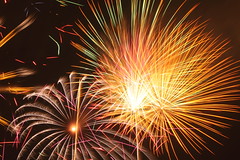 As we all know, time passes and our camp years are limited by the fact that we’re only children once. It’s easy to feel briefly melancholy at year’s end as time waits for no one, but of course, December also means that the promise of a new year is around the corner! In January, we’d like to continue looking backwards and forwards while thinking about camp and we’d especially love to hear from camp alumni. What’s the funniest thing that happened to you at camp? How did camp contribute to your adult life? We’d like to hear about the memories you hold dear and close to your heart, or what you wish for campers next year? If you’re counting the days until camp starts, what are YOU planning?
As we all know, time passes and our camp years are limited by the fact that we’re only children once. It’s easy to feel briefly melancholy at year’s end as time waits for no one, but of course, December also means that the promise of a new year is around the corner! In January, we’d like to continue looking backwards and forwards while thinking about camp and we’d especially love to hear from camp alumni. What’s the funniest thing that happened to you at camp? How did camp contribute to your adult life? We’d like to hear about the memories you hold dear and close to your heart, or what you wish for campers next year? If you’re counting the days until camp starts, what are YOU planning?
For now, “Happy New Year” to everyone and let the countdown to Camp 2011 begin!
Emma

Thanks for the images quinn.anya and megawheel360.

